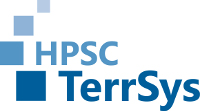Objectives
The objective of this applied course is to provide the theoretical and technical context of terrestrial modeling in high-performance scientific computing (HPSC) environments utilizing a stand-alone land surface model, and in combination with a subsurface and atmospheric model.
Utilizing the Community Land Model (eCLM), the course will focus on land surface processes and land surface modeling with an outlook to coupled modeling involving the atmosphere and deeper subsurface. The course will focus on using this model in a high-performance computing infrastructure. The course will also pay attention to data science aspects of land surface modelling: data management, machine learning and data assimilation will be topics during two full days of the course. The main course topics are:
- setting up a land surface model and performing simulations in massively parallel supercomputer environments at the Jülich Supercomputing Centre,
- land surface model simulations involving biogeochemical cycles and dynamic simulation of vegetation states,
- management of (big) data and machine learning methods,
- parallel data assimilation using TSMP-PDAF (Parallel Data Assimilation Framework),
- post-processing and visualization in the age of big data,
- outlook to coupled atmosphere-land surface-subsurface modelling with the Terrestrial Systems Modelling Platform version 2.
Learning Outcomes
Completion of the course will provide the participants with the generic capabilities of land surface modeling including biogeochemical cycles in supercomputing environments with a focus on eCLM. The course will also introduce coupled modelling of the atmosphere-land surface- subsurface. Data science in combination with such models, like the handling of very large data sets in the analyses and visualization process, and machine learning and data assimilation methods, is part as well of the course.
Target Audience and Prerequisites
- Master or PhD students, PostDocs with a deep interest in terrestrial modeling (hydrology, land surface, atmosphere)
- Basic knowledge of LINUX/UNIX and programming languages such as R, Python, C/C++, or FORTRAN as well as data formats such as NetCDF is an advantage


